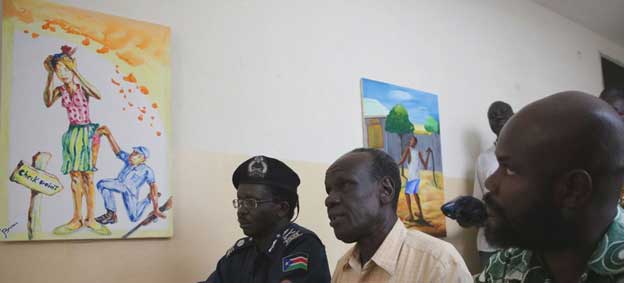
Civil Society, Editors’ Choice, Featured, Gender, Gender Violence, Global, Headlines, Health, Human Rights

An art exhibition in Juba, supported by the UN mission in South Sudan (UNMISS), seeks to educate people about gender and sexual based violence. Credit: UNMISS/Nektarios Markogiannis
– Calling it “so disappointing and disheartening” in social media on 17 October, Dr. Rosie James, a British medical expert, announced that “I was sexually assaulted by a World Health Organization (WHO) staff tonight at the World Health Summit.”
WHO, as we all know, is a part of the UN system of entities. She went to emphasize that “This was not the first time in the global health sphere that this has occurred (for MANY of us).”
Dr. James further elaborated to our disdainful shame that “I want to make something clear. This is not just a WHO or UN issue. I and many others have experienced sexual abuse in medicine and field NGOs, for example. Workplaces need to be safe and supportive environments for all. And it will take each one of us to make that a reality.”
It is an embarrassment to the international community that she warned that “We must do better #Zero Tolerance; # MeToo; #Gender Equality.”
In 2021, an independent commission reported on cases concerning WHO personnel responding to the tenth Ebola virus epidemic in the Democratic Republic of the Congo. That was not enough of a warning bell for the WHO staff and its leadership. Now this.
To make the matter worse, CNN reported another shocking news about a UN employee getting a 15-year prison sentence by a US court for multiple sexual assaults, perpetrating “monstrous acts against multiple women over nearly two decades.”
During some years of that period. the staff worked for UNICEF, known for its longstanding, unblemished record of care and dedication for the world’s children.
These and many other such cases, particularly UN peacekeepers and other staff of UN peace operations encouraged the US government to announce on 26 October that it has established its engagement principles for use by all federal agencies engaging with the United Nations and other International Organizations on the prevention and response to incidents of sexual exploitation and abuse and sexual harassment.
These principles reflect the US government’s “commitment to increase U.S. engagement in a clear and consistent manner” and to “promote accountability and transparency “in response to such issues.
This is the first time a Member State has publicly declared a set of “engagement principles” to work with the UN in an area of utmost importance which puts the UN’s credibility at stake.
More so, as it is announced by the largest contributor to the UN budget and a veto-wielding Member of the UN.
Substantively, there are many positive aspects of these principles in putting the UN on guard. But at the same time, if various Member States start announcing such “engagement principles” in various areas and issues and insist on pursuing those in the context of UN’s work, a chaotic situation is bound to emerge.
The UN has yet to make its position known on the US announcement which in effect is an expression of the latter’s frustration about the way the UN has been handling the sexual exploitation abuse cases in a rather lackadaisical manner over the years.
Its much-touted zero-tolerance and no-impunity policies have not improved the situation to the satisfaction of many well-wishers of the UN.
Zero-tolerance policy is applied by the UN system entities as if they are using a zebra-crossing on a street which does not have any traffic lights.
The non-governmental entity the Code Blue Campaign is the most articulate and persistent actor with regard to the sexual exploitation and abuse (SEA) issues and incidents in the UN system as a whole.
The Campaign, steered by Stephen Lewis and Paula Donovan as the co-founders, surely deserves the global community’s whole-hearted appreciation and highest commendation for its laudable work.
It has correctly emphasized that “… unjust UN policies and practices have, over decades, resulted in a culture of impunity for sexual “misconduct” ranging from breaches of UN rules to grave crimes. This represents a contravention of the UN Charter.”
The labyrinthine rules, regulations, procedures, channels of communication of the UN make the mockery of the due-process and timely justice. These have been taken advantage of by the perpetrators time and again.
As most of the SEA incidents happen at the field levels, nationalities and personal equations play a big role in delaying or denying justice.
The victim-centred approach of the UN in handling SEA cases has been manipulated by the perpetrators and their organizational colleagues to detract attention from their seriousness.
Not only the victims should get the utmost attention, so should be the abusers because upholding of the justice is also UN’s responsibility.
Also, UN watchers become curious whenever media publish such SEA related reports, the UN authorities invariably mentions the concerned staff is on leave or administrative leave. When these cases are in the public domain, the abusers are merrily enjoying the leave with full pay.
It is also known that during the leave the abusers have tried to settle the matter with the victims or their families with lucrative temptations. The leave has also been used to wipe off the evidence of the crime. These have happened in several cases with the full knowledge of the supervisors.
What a travesty of the victim-centred approach!
The head of the UN peace operations where the SEA cases take place should be asked by the Secretary-General to explain the occurrence as a part of his or her direct responsibility. Unless such drastic measures are taken the SEA would continue in the UN system.
Another unexpectable dimension of the victim-centred approach is that the abuser-peacekeepers are sent back home for dispensation of justice as per the agreement between the troops contributing countries (TCC) and the UN. Sending them home is one of the biggest reasons for the continuation of SEA in the peace operations.
The victim is not present in that kind varied national military justice situation and no evidence are available except UN-cleared reports to show or suppress the extent of abuse.
Again, a travesty of justice supported by the upholder of the global rule of law!
The UN Secretary-General would be well-advised to propose to the Security Council a change in the clause of the agreement that UN signs with the TCCs which incorporates for repatriation of abuser-peacekeepers to their home countries. If a TCC refuse to do so, the agreement would not be signed. Period.
A functional, quick-justice global tribunal should be set up with the mandate to try the peacekeepers as decided by the UN. If the International Criminal Court (ICC) can try heads state or government for crimes against humanity, why the UN peacekeepers cannot be tried for SEA?
That would be a true victim-centred approach!
Ambassador Anwarul K. Chowdhury is a former Under-Secretary-General and High Representative of the United Nations; former Ambassador of Bangladesh to the UN and President of the Security Council
IPS UN Bureau
